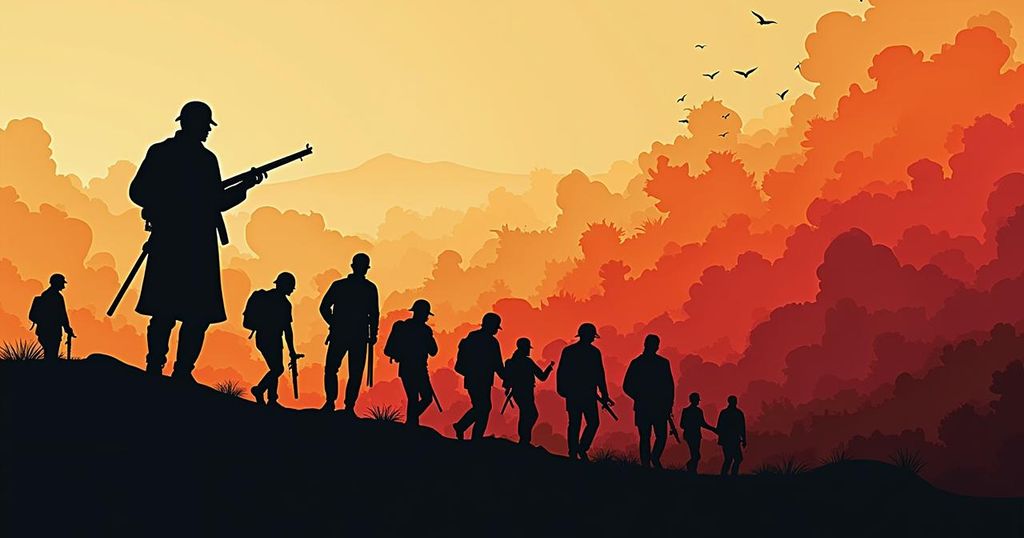This article explores the complexities and differences between the conflicts in Palestine and Kashmir. Noting their colonial roots, it outlines the distinct geopolitical contexts that have shaped their trajectories. The ongoing tensions in Lebanon and the Palestinian territories are highlighted, along with the implications of external influence and internal dynamics. The narrative underscores the need for nuanced understanding and strategic international responses to these persistent issues.
In a discourse surrounding the intricate dynamics of colonial conflict, parallels have often been drawn between the situations in Palestine and Kashmir. Both were notably mentioned by Pakistan’s Prime Minister at the United Nations last week, reflecting a broader narrative of colonial legacies that have left their populations yearning for rights promised by United Nations resolutions. Historically, the genesis of these conflicts can be traced back to 1948, the year Israel was established and the timing of India’s confrontation with Pakistan over Kashmir. While they share superficial similarities, such as an ongoing struggle for self-determination, they differ significantly in their geopolitical contexts and international ramifications. The Kashmir issue, which witnessed military stalemates between India and Pakistan, has often been overshadowed by the more volatile and enduring conflict in Palestine. The Kashmir dispute experienced a hiatus following the Shimla Agreement of 1972, but reignited in 1989 following significant global geopolitical shifts which saw the collapse of the USSR. The ensuing armed resistance has since created a heavily militarized landscape in the region. In contrast, the Palestinian plight has been exacerbated by relentless military campaigns led by Western powers, with support from regional allies, resulting in significant destabilization across the Middle East. Key players, such as Saudi Arabia and Jordan, have historically had roles in these dynamics, which has differentiated the experiences of Palestinians from those of Kashmiris. Within the context of the 1990s Kashmir uprising, concerns regarding potential nuclear conflict between India and Pakistan were exacerbated by statements from resistance leaders who advocated for peaceful resolutions to avoid catastrophic outcomes. However, the discourse surrounding this nuclear apprehension often lacked practical grounding and ultimately remained unfulfilled. Last week’s address by Prime Minister Shehbaz Sharif highlighted Pakistan’s ongoing readiness to confront perceived military threats from India. This rhetoric reflects an ongoing strategy of ‘internationalizing’ the Kashmir issue. However, India’s strategic presentation in Kashmir, involving foreign diplomats observing local elections, presents a contrasting narrative that emphasizes its engagement with the international community. The current geopolitical landscape is further complicated by the sophisticated surveillance capabilities employed by Israel, which are focused on monitoring threats from groups such as Hezbollah and Hamas in the region. This surveillance has intensified the conflict, leading to casualties and ongoing military engagements in Lebanon. The recent developments regarding the death of key Hezbollah leaders underscore the intricate and precarious nature of this conflict. Hezbollah has pledged to sustain the confrontation against Israeli forces, guided by Iranian support, demonstrating a determination to preserve regional power dynamics. This situation suggests that the conflict in Lebanon could escalate unless major global powers act to mitigate the tensions promptly, as approximately ninety percent of Hezbollah’s fighters remain poised for further confrontations. Intriguingly, the conflict in Lebanon and the broader Middle Eastern disputes involving Israel may offer lessons for the Kashmir situation, presenting an opportunity for analysis of the enduring impacts of colonial legacies on contemporary conflict.
The longstanding conflicts in Palestine and Kashmir, both rooted in colonialism, continue to shape regional dynamics in the Middle East and South Asia. The establishment of Israel in 1948 and the ensuing military confrontations over Kashmir between India and Pakistan have led to political stalemates and ongoing strife, reflecting the complexities of post-colonial governance and identity. These conflicts illustrate the consequences of territorial disputes and the international community’s role—or lack thereof—in facilitating resolutions. The unique historical and geopolitical contexts of these regions provide important insights into current military and socio-political issues. Furthermore, the rise of different geopolitical interests, particularly those involving Western powers, has influenced the course of these conflicts, manifesting in disparate degrees of support for local uprisings and the maintenance of regional stability. The implications of these relationships extend not only to immediate political concerns but also to broader themes of identity, sovereignty, and resistance among the respective populations involved.
In concluding this analysis, it becomes evident that while Palestine and Kashmir may bear an apparent resemblance as legacies of colonial conflict, the unique historical trajectories and geopolitical contexts of each region demand distinct responses and understandings. As military tensions continue to unfold, especially in Lebanon and against the backdrop of the Middle Eastern geopolitical landscape, it is crucial to recognize the diverse challenges faced by each locality and consider the role of international powers in either exacerbating or alleviating these conflicts. The need for strategic dialogue, meaningful international engagement, and a focused approach to conflict resolution remains paramount in addressing the enduring grievances of these regions.
Original Source: clarionindia.net






